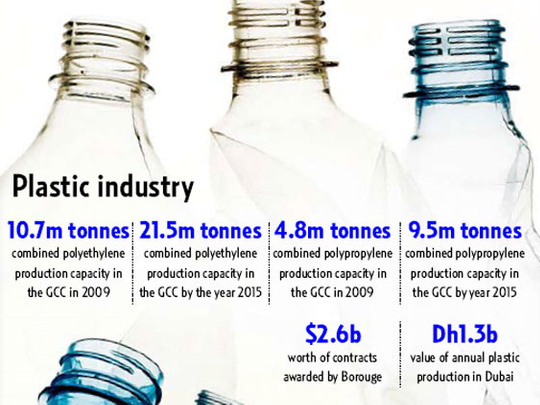
Dubai: The UAE and the Gulf region are going to become one of the world's largest sources of petrochemical and plastic products as the oil-producing countries invest heavily in downstream petrochemicals.
Last month Abu Dhabi-based polymer producer Borouge awarded $2.6 billion (Dh9.54 billion) worth of contracts to expand its capacity and create the world's largest petrochemical complex in Ruwais, Abu Dhabi.
The plastics industry is one of the leading manufacturing sectors in Dubai, according to the Dubai Export Development Corporation 2009 report.
The report estimates that the value of annual plastic production in Dubai is Dh1.3 billion.
According to Dr Abdul Wahab Al Sadoun, secretary general of GPCA Plastics Summit the industry is set to continue on a positive growth pattern in the region.
The polyethylene production capacities in the GCC will increase from 10.7 million tonnes in 2009 to 21.5 million tonnes by the year 2015, an increase of slightly over 100 per cent
Massive increases
The production capacity for polypropylene will also increase from 4.8 million tonnes in 2009 to 9.5 million by 2015, an increase of 98 per cent.
This will bring the combined production capacities of the two major polyolefin resins to over 31 million tonnes by 2015.
"This region is emerging as a leading global plastic production resin hub with capacities expected to double over the next five years or so," said Al Sadoun.
This increased capacity in the region means the Middle East will increase its share of global PE capacity from 13 per cent in 2008 to 19 per cent in 2015, making it the leading global player.
"This massive capacity expansion drive taking place in the Gulf region is also bringing a more diversified product portfolio to the industry with a number of new goods being produced for the first time over the next five years, including engineering plastics, acrylics and synthetic rubber.
"These new products will stimulate a new breadth of downstream industries in the Gulf region, resulting in more value added as well as creating numerous job opportunities," Al Sadoun said.
According to Satish Khanna, general manager of Al Fajer Information and Services there are currently around 95 manufacturers producing products such as bottles and other containers, pipes and fittings, bags, doors and windows, caps and lids, foils and utensils.
The UAE has concentrated on diversifying its economy by investing heavily in the plastics industry, according to Ulrich Reifenhaeuser, chairman of the K2010 Exhibitors Committee.
"The GCC is heading towards reaching a stage where there is self-sufficiency in the production of plastics for the region's domestic use," he said.
According to Khanna, the growth of the UAE plastics industry has been fuelled by industrial modernisation initiatives by the UAE government in order to reduce its dependence on imports of plastics by enhancing local manufacturing.
"The government has been trying to encourage the industry's export development by promoting the industry and taking its members to different exhibitions and seminars around the world in order to give them exposure and raise awareness," said Khanna.
The government is also taking an active role in encouraging SME growth in the industries through financial aid and support. According to Khanna, there are on average 700 SMEs a year opening up in the industry.
The growth of the plastics industry has also increased employment in the country. Employment in plastics and rubber makes up 4 per cent of the total employment in manufacturing in the Gulf, according to the Gulf Organisation for Industrial Consulting (GOIC).












